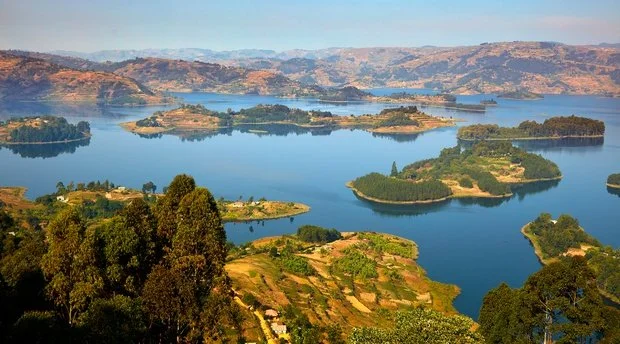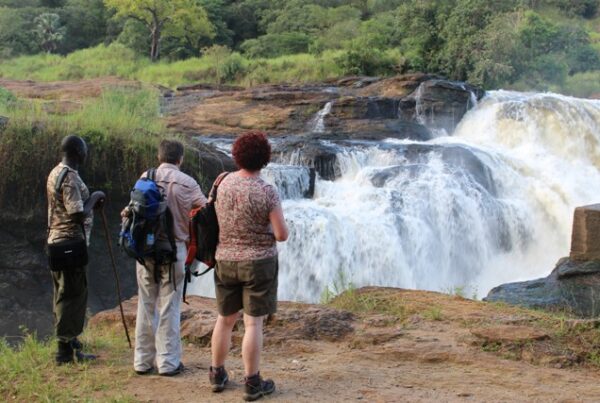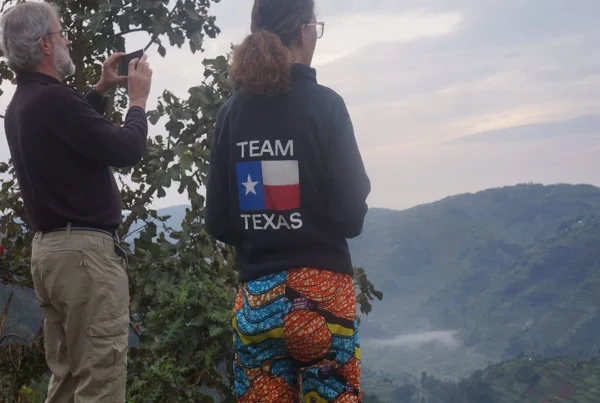Eco-Lodge Reviews at Lake Bunyonyi: Local’s Guide with Kids
Where Nature, Family, and Luxury Intertwine
There are destinations that carry an air of mystery, places where nature writes its poetry in still waters and rolling hills, and where each sunrise seems like a new invitation to explore. Lake Bunyonyi, in southwestern Uganda, is such a place. Known as the “Lake of the Little Birds,” it is Africa’s second-deepest lake, dotted with 29 lush islands that rise like emeralds from its reflective surface. For families seeking a luxury retreat that blends sustainability, relaxation, and adventure, Bunyonyi is both an escape and a discovery.
Unlike many destinations where parents must compromise between indulgence and children’s needs, Lake Bunyonyi creates harmony. Here, eco-lodges designed with sustainability at their core offer luxury that is responsible, inclusive, and family-friendly. They provide spaces where children can learn and play, where parents can rejuvenate, and where nature becomes both a playground and a classroom.
This guide is written with the eye of a local who has seen Lake Bunyonyi evolve into a haven for travelers. It reviews eco-lodges through the lens of family experiences, offering first-time visitors and seasoned explorers insights into what makes Bunyonyi not just beautiful, but profoundly enriching when traveling with kids.
The Enchantment of Lake Bunyonyi
Lake Bunyonyi rests between Kisoro and Kabale districts, just a few hours from Bwindi Impenetrable Forest. Its name, derived from the abundance of small birds that inhabit its shores and islands, speaks to its natural wealth. The lake is bilharzia-free, crocodile-free, and hippo-free, making it one of the safest freshwater lakes in Africa for swimming and family recreation.
The setting itself is luxurious. Rolling terraced hills surround the lake, painted with vibrant greens from banana plantations and dotted with traditional homesteads. Mist often lingers over the water in the morning, creating a dreamlike canvas. For children, this environment sparks imagination, while for adults it offers tranquility unmatched by busier tourist hubs.
To stay in an eco-lodge here is to enter a dialogue with the land. Lodges are designed to blend with the environment, using local materials, renewable energy, and community-driven practices. For families, this translates into an experience that is safe, comfortable, and meaningful — a combination that makes Lake Bunyonyi one of Uganda’s most beloved family escapes.
What Defines an Eco-Lodge at Lake Bunyonyi?
Eco-lodges at Lake Bunyonyi are not just accommodations but philosophies of living with nature rather than against it. Built with minimal environmental impact, they feature designs inspired by local traditions — thatched roofs, wooden decks, stone paths, and open spaces that encourage connection with the landscape.
Sustainability manifests in multiple ways. Many lodges use solar power for electricity and heating, harvest rainwater, and practice waste recycling or composting. Gardens surrounding these lodges often supply fresh vegetables and herbs, while fish served at the dining tables is frequently sourced directly from the lake.
For families with kids, this sustainability becomes an education. Children witness how luxury can coexist with responsibility, learning lessons about ecology and culture in a way no classroom can replicate.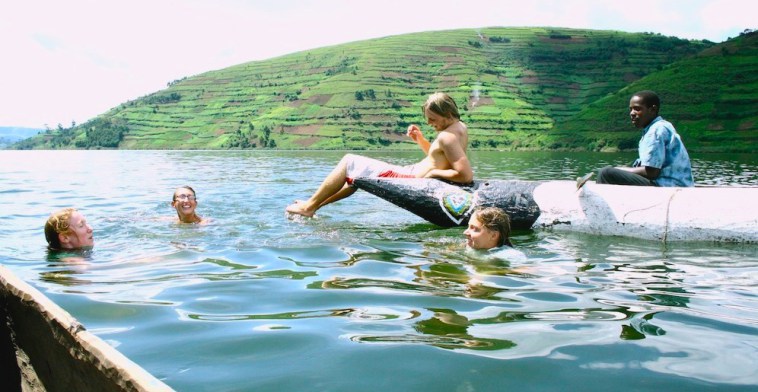
Family-Friendly Eco-Lodges — Spaces of Comfort and Adventure
Several eco-lodges around Lake Bunyonyi have gained reputations for their unique balance of luxury, sustainability, and family inclusivity. Each offers something distinct, yet all share a commitment to creating an environment where parents and children alike feel welcome.
Rooms often include family cottages or interconnecting suites, designed with space and privacy in mind. Play areas, shallow swimming spots, and guided activities ensure that children are engaged, while adults enjoy moments of leisure. The essence of luxury here is not extravagance but personalized experiences: dining under starlit skies, waking to bird calls, and exploring islands with private guides who tailor excursions to families.
Well-trained staff members, many from nearby communities, often serve as cultural interpreters for children, teaching them local songs, dances, and crafts. These moments of connection ensure that the stay is not only about seeing a destination but becoming part of it.
Dining Experiences — Where Taste Meets Education
Food at eco-lodges around Lake Bunyonyi is more than nourishment; it is an expression of both culture and sustainability. Menus celebrate Uganda’s organic abundance: matoke, groundnut sauce, tilapia from the lake, and fresh fruits such as pineapples and passion fruit. International influences are often blended in, ensuring variety and refinement.
For children, meals become both delicious and educational. Many lodges encourage kids to visit gardens where ingredients are grown, teaching them the value of farm-to-table dining. Cooking classes for families sometimes allow children to try their hands at preparing traditional dishes, making dining an adventure rather than a formality.
Luxury in this context lies in detail: meals prepared with care, options tailored to children’s tastes, and dining experiences set against breathtaking backdrops of lake and hills.
Activities for Families with Kids
Lake Bunyonyi thrives on activity, offering adventures that families can share together. Canoe rides across the calm waters are among the most iconic experiences. Traditional dugout canoes allow parents and children to paddle between islands, listening to local stories about their names and histories. For children, the thrill of gliding on water that feels endless is unforgettable.
Hiking trails around the lake provide gentle to moderate challenges suitable for families. Along the way, kids encounter local farms, spot exotic birds, and interact with villagers whose warmth leaves lasting impressions. Swimming in designated safe areas of the lake offers another highlight, with the cool, clean waters a delight for children on warm afternoons.
Eco-lodges often organize cultural performances or craft workshops in the evenings. Children can participate in basket weaving, bead-making, or drumming sessions, channeling creativity while connecting with traditions. These activities enrich the family experience, ensuring that luxury is remembered not as indulgence but as shared joy.
Safety and Comfort — A Parent’s Assurance
For families, especially those with children, safety is paramount. Lake Bunyonyi’s eco-lodges prioritize this through thoughtful design and attentive service. The absence of dangerous aquatic animals makes the lake uniquely reassuring for parents who wish to allow their children to swim. Lodges often provide life jackets, safe swimming zones, and supervision where needed.
Hygiene and comfort are equally prioritized. Eco-lodges maintain high standards of cleanliness, with filtered water, mosquito nets, and well-maintained facilities ensuring health and ease. Staff are accustomed to hosting families, offering flexible meal times and child-focused services.
For luxury travelers with children, this assurance transforms the experience from worry to relaxation, allowing parents to enjoy the same depth of indulgence as they would on a solo or couple’s journey.
Seasons and the Best Times for Families
Lake Bunyonyi’s appeal shifts subtly with the seasons, and timing a family visit is important. The dry seasons — December to February and June to September — are ideal for families with children. Trails are manageable, skies are clear, and outdoor activities unfold with minimal disruption. Canoeing and hiking during these months are particularly enjoyable.
The wet seasons, March to May and October to November, bring heavier rains. While this season offers lush greenery and quieter lodges, trails can be muddy, and outdoor excursions may be interrupted. Families who prefer less crowding and enjoy indoor activities might still find this season rewarding, as eco-lodges provide cozy environments with fireplaces, storytelling sessions, and cultural programs to keep children engaged.
For locals guiding families, the best advice is to align visits with dry months for ease and comfort, but to embrace wet seasons if privacy and intimacy are priorities.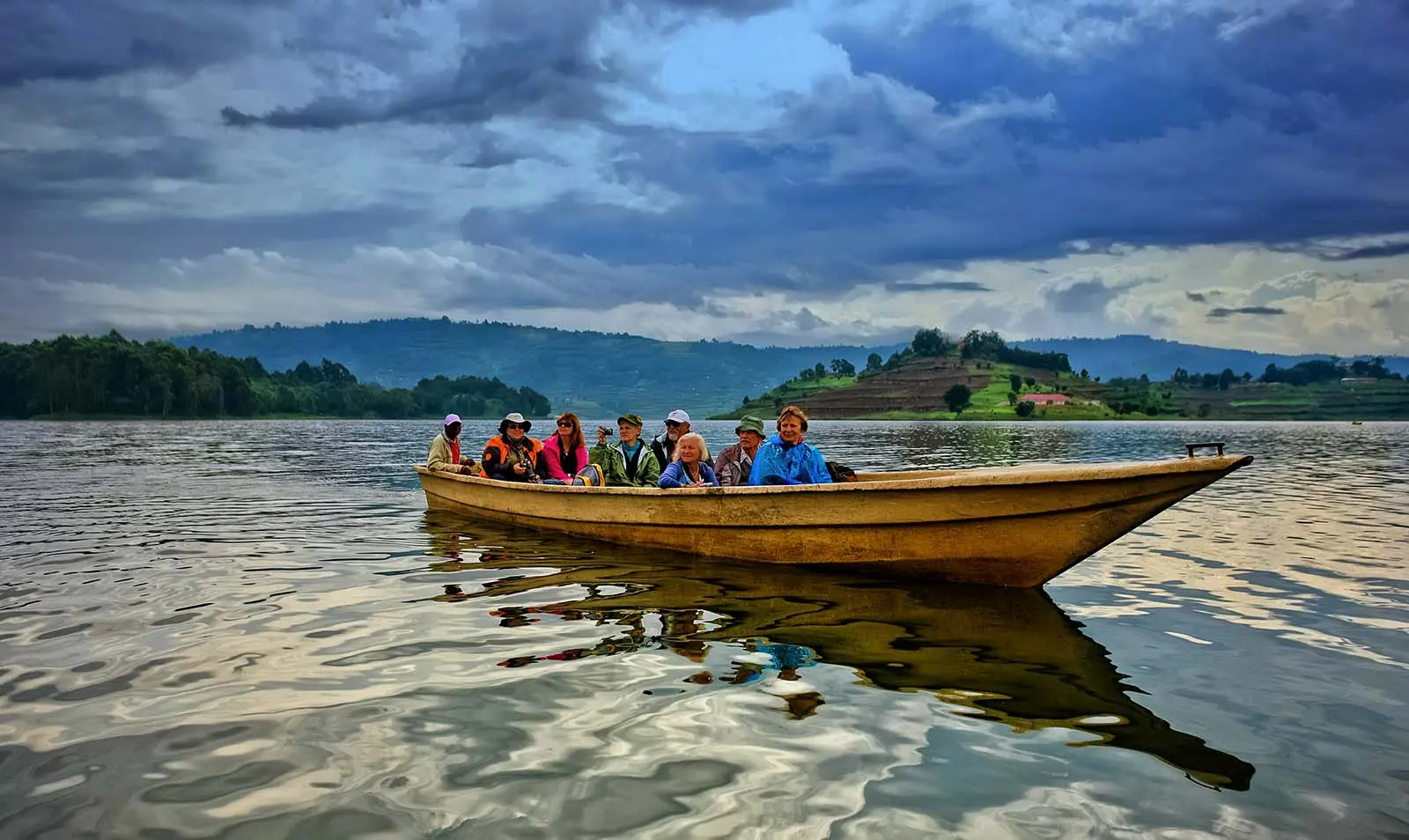
Cultural Context — Teaching Children the Human Story
Eco-lodges around Lake Bunyonyi are deeply connected to nearby communities. Families traveling with kids are often introduced to the Bakiga and Batwa peoples, whose traditions form the cultural fabric of the region.
For children, these interactions are transformative. Visiting a local school, listening to folktales, or watching traditional dances provides lessons that no classroom can replicate. They learn empathy, appreciation for diversity, and the joy of human connection.
Parents often find that these cultural exchanges enrich not only their children’s experience but their own, reminding them that luxury travel is not isolation from local life but immersion into it, carried out with respect and authenticity.
Conservation and Responsibility — Lessons for Young Minds
One of the most powerful aspects of staying in eco-lodges at Lake Bunyonyi is the opportunity to teach children about sustainability. Lodges often involve guests in conservation activities such as tree planting, wetland restoration, or bird-watching walks that highlight endangered species.
For kids, these activities are hands-on lessons in environmental stewardship. They see how waste is recycled, how solar panels generate electricity, and how communities thrive when tourism supports conservation. For parents, the greatest luxury is knowing that travel is leaving a positive legacy — shaping not only the environment but also the values of the next generation.
Wellness and Reflection for Families
Even with children in tow, Lake Bunyonyi offers abundant opportunities for wellness. Early mornings spent watching mist lift from the water create moments of shared stillness for families. Lodges often offer spa services for parents, while kids are entertained with creative activities. Family yoga sessions overlooking the lake or gentle walks through terraced hills provide both exercise and bonding.
Luxury here lies in balance: children play and learn while parents relax and restore. The lake itself, timeless and serene, becomes a teacher of calm, reminding families of the value of slowing down together.
Why Eco-Lodges Are the Perfect Choice for Families
Unlike conventional hotels, eco-lodges at Lake Bunyonyi offer families holistic experiences. They provide comfort without excess, immersion without disruption, and indulgence without guilt. For parents, they ensure peace of mind. For children, they create wonder. For both, they establish a shared memory where luxury is not about separation from nature but intimacy with it.
The local’s perspective emphasizes that Bunyonyi is best experienced slowly. Families who linger discover that every island, every trail, and every evening by the fire adds another layer of richness to their journey. First-time visitors often depart with the promise to return, not because they saw everything but because they realized there was always more to discover.
Book with WildHorn Africa
For families seeking to embrace Lake Bunyonyi’s eco-lodge experiences at their finest, WildHorn Africa is the trusted companion. With expertise in crafting luxury, family-friendly safaris, they ensure that every detail — from selecting the most suitable lodge to arranging child-friendly excursions — is curated with precision and care.
By booking with WildHorn Africa, families gain more than a vacation. They gain peace of mind, knowing their travels support conservation, empower local communities, and provide children with life-changing experiences. Each itinerary becomes a story of elegance, responsibility, and joy — a story that Lake Bunyonyi, with its shimmering waters and islands of wonder, tells best.
In 2025 and beyond, the lake remains one of Uganda’s most cherished treasures. And with WildHorn Africa, families discover it not only as travelers but as part of a legacy of luxury, sustainability, and shared adventure.


